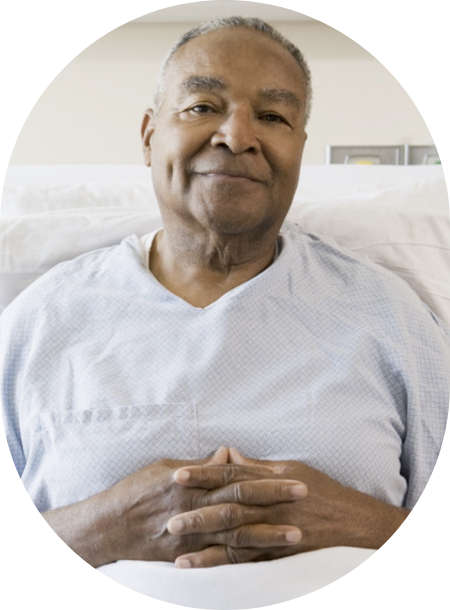PROSTATE SURGERY
The Day of the Operation
If you choose to undergo surgery to treat your prostate cancer, a date for your operation can usually be scheduled just a couple of weeks after your initial consultation.
Before the operation
01
You will be admitted on the day of your operation having had instructions about when to stop eating and drinking. Your pre-assessment tests (blood and urine tests, infection swabs and an ECG) will have been done 1-2 weeks previously.
02
You will see both Professor Eden and the anaesthetist before the operation and can put any last-minute questions to them then, as well as sign the consent form.
03
Your operation will usually start at either 9 am or 1 pm and take approximately 2 hours. You will be asleep during the operation but will be offered an injection in the back (spinal anaesthesia) before you go to sleep to numb you from the waist down so that when you wake up after the operation you will be entirely comfortable.
04
Don’t worry if you are nervous!
This is entirely normal. The team have done this operation thousands of times before and will take good care of you.
01
The operation will be done with keyhole surgery via 6 small incisions in the lower part of the abdomen. The instruments will be operated by your surgeon via a da Vinci robot, which will give him 3D vision, motion scaling and wristed technology. All of this will result in a precise operation.
02
You will be kept asleep by a Consultant Anaesthetist and their assistant using a combination of drugs delivered by injection and via the breathing tube placed in your throat for the duration of the surgery.
03
The details of the surgery will have been discussed with you beforehand. Specifically, the great majority of patients will have nerve sparing surgery. This means that the nerves that control erections will be preserved. Patients with more aggressive and/or bulky tumours may need to have one or both nerves intentionally removed but if this is anticipated this will have been discussed with you beforehand.
04
If your pre-operative PET CT scan suggests it, you may need to have some of the pelvic lymph nodes that drain the prostate removed. These are structures that filter infection and cancer from the fluid returning from the tissues into the circulation. You have several hundred of these structures and if some are removed then the fluid simply finds another channel to flow through to return to the circulation. Removing these lymph nodes completes the staging of your cancer and will also increase the probability of cure.
05
Once the prostate has been freed it is placed intact into an impermeable plastic bag inside your abdomen to be retrieved at the end of the procedure. This is done so the cancerous cells do not touch healthy tissue. The two structures either side of it (the bladder and the urethra) are then connected using stitches and a catheter (a soft plastic tube) is inserted in the urethra and through the join. This is left in place for 2 weeks until the join has healed. All internal and external stitches dissolve after a few weeks.
After the operation
At the end of the operation the anaesthetic drugs are discontinued and you will gradually wake up. You will probably not remember anything before waking up in the Recovery Room with an oxygen mask on your face, two drips in your arm and a catheter in place. You will stay there for at least an hour before going back to your room. The purpose of this time is to make sure that your vital signs are normal, that your catheter is draining well, you are comfortable and not feeling sick. It is normal to have the sensation of wanting to pass urine – this is due to the presence of the catheter and the surgery on your bladder.
For a complete overview of the procedure, outcomes, and recovery, visit our main Robotic Radical Prostatectomy page.


